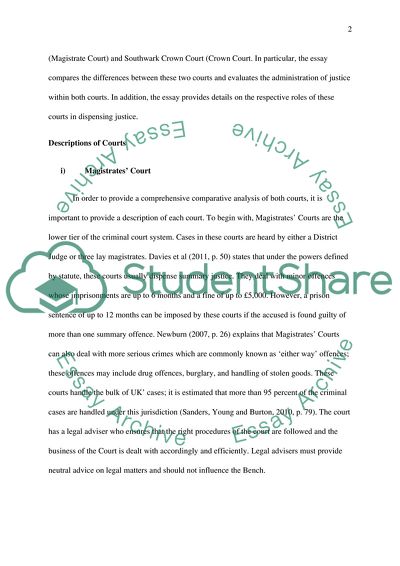Cite this document
(Comparative Analysis of Observed Proceedings in Brent Magistrates Essay, n.d.)
Comparative Analysis of Observed Proceedings in Brent Magistrates Essay. Retrieved from https://studentshare.org/law/1765730-criminology-students-are-required-to-add-an-experiential-aspect-to-their-learning-by-observing-proceedings-in-a-magistrates-and-a-crown-court-you-will-complete-a-3000-word-comparative-analysis-essay-discussing-your-visits-and-providing-evaluative
Comparative Analysis of Observed Proceedings in Brent Magistrates Essay. Retrieved from https://studentshare.org/law/1765730-criminology-students-are-required-to-add-an-experiential-aspect-to-their-learning-by-observing-proceedings-in-a-magistrates-and-a-crown-court-you-will-complete-a-3000-word-comparative-analysis-essay-discussing-your-visits-and-providing-evaluative
(Comparative Analysis of Observed Proceedings in Brent Magistrates Essay)
Comparative Analysis of Observed Proceedings in Brent Magistrates Essay. https://studentshare.org/law/1765730-criminology-students-are-required-to-add-an-experiential-aspect-to-their-learning-by-observing-proceedings-in-a-magistrates-and-a-crown-court-you-will-complete-a-3000-word-comparative-analysis-essay-discussing-your-visits-and-providing-evaluative.
Comparative Analysis of Observed Proceedings in Brent Magistrates Essay. https://studentshare.org/law/1765730-criminology-students-are-required-to-add-an-experiential-aspect-to-their-learning-by-observing-proceedings-in-a-magistrates-and-a-crown-court-you-will-complete-a-3000-word-comparative-analysis-essay-discussing-your-visits-and-providing-evaluative.
“Comparative Analysis of Observed Proceedings in Brent Magistrates Essay”, n.d. https://studentshare.org/law/1765730-criminology-students-are-required-to-add-an-experiential-aspect-to-their-learning-by-observing-proceedings-in-a-magistrates-and-a-crown-court-you-will-complete-a-3000-word-comparative-analysis-essay-discussing-your-visits-and-providing-evaluative.


